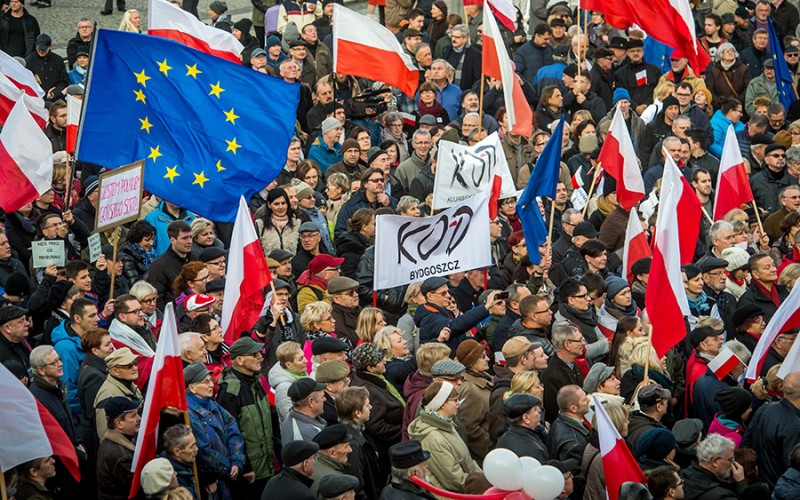By Olivier Bault.
Poland – The Poles voted on Sunday, October 21, to elect their mayors, municipal councilors, councilors in the powiats (cantons) and advisers for the voivodedship sejmik (regional councils) of the sixteen voivodeships in the country. A journalist from public radio Polskie Radio commented on Monday morning the reactions of the leaders of the different parties while having fun because, unlike sport where there is always a winner and losers, in politics there are only winners. And it is true that the two great enemy camps, which considered these elections as a test before the European elections and next year’s elections, had both reasons to rejoice.
The Liberals gathered in the Civic Coalition (KO, formed by the Civic Platform parties – PO – and Nowoczesna) had the good surprise to win the Warsaw City Hall in the first round, with the absolute majority of the city council and especially 56.7% of the votes for their candidate Rafał Trzaskowski against only 28.5% for the candidate of the PiS Patryk Jaki. This is a big disappointment for the PiS, because if the Liberal candidate was a favorite in the polls, no one expected him to win the mayoralty in the first round. Patryk Jaki’s entire left-wing campaign, including his alliance with a pro-LGBT leftist leader who was to become his deputy for education and culture, will not have paid off. The fact that Jaki is head of the parliamentary commission of inquiry into “reprivatisation” cases in Warsaw was also perceived as a conflict of interest and displeasing to the Varsovians.
In the same way, the Liberal candidates won in the first round in Łódź (where the winner, under a conviction for falsification of documents, is not sure of being able to stay at her post), Poznań (where the outgoing mayor is, like Trzaskowski, a representative of the left in favor of LGBT lobby claims) and with a very short lead in Wrocław. In Gdańsk, the KO candidate Jarosław Wałęsa, son of Lech Wałęsa, has been eliminated in the first round, but the outgoing mayor, close to the Liberals, has every chance to win the second round against the young candidate of the PiS. In Krakow too, the outgoing mayor supported by the KO was close to the absolute majority in the first round and the chances of the PiS candidate in the second round are minimal. The PiS will be consoled with Katowice where his outgoing mayor got an absolute majority of votes in the first round. In general, in the municipal elections, Polish voters have an old tendency that drives them to almost automatically renew the leavers. Under a new law passed by the current majority, mayors are now elected for 5 years instead of 4 but they are only allowed two consecutive terms (from now on), so things could change, but in just 10 years. In general too, Liberals dominate in large cities, while PiS dominates in small towns and in the countryside. There is also a divide between the east, which belongs globally to the PiS, and the west, which belongs globally to the Liberals, which is confirmed by these elections.
At regional elections, however, the PiS recorded a strong increase compared to 2014, even if its result is below expectations. Regarding this progress, it should nevertheless be noted here that in 2014, under the PO-PSL government, the extent of the irregularities could have distorted the overall result of the elections. Still, the PiS, which controlled only one voivodeship in the south-east of the country, now has an absolute majority in six out of sixteen voivodedship sejmik compared to only one for KO Liberals. As for the others, the PiS has a relative majority in three of them against six for the KO. But, except in Lower Silesia, where the PiS could get along with the list Bezpartyjni Samorządowcy which is not related to any political party, in all the other Voivodeships where it does not have an absolute majority an anti-PiS coalition gathering the Liberals, the PSL agrarian party and the post-Communist SLD social democrats is the most likely outcome, including in Silesia where PiS regional councilors are only one seat of the absolute majority.
On the other hand, in Silesia, the autonomists / separatists of the RAŚ (“Silesian Autonomy Movement”), who participated since two legislatures in a coalition with the PO and the PSL and who were notably very active in the regional institutions related to culture and history, in which they sought to reproduce the strategy of Catalan separatists in the 1980s, will this time be absent from the regional council despite the support they receive from the local press owned by German capital. This is good news for Silesia and for Poland.
In the register of foreign interference in favor of friends of Donald Tusk against the PiS, we note the campaign of Onet.pl of the German-Swiss group Ringier Axel Springer against Prime Minister Mateusz Morawiecki in the home stretch of the campaign and especially the order issued Friday (two days before the elections!) by the Spanish Vice-President of the Court of Justice of the European Union to suspend provisionally the Polish law reforming the Supreme Court. Apart from the fact that the CJEU seems very clearly, by this order, to exceed its competences, the moment chosen and the accelerated procedure arouse many suspicions and this could contribute to the poor results of the PiS in big cities, where the electorate is rather mostly “Europeanist” in addition to being more Liberal-Libertarian than in the rest of the country.
At the national level, the different lists for the regional elections obtained the following results (based on the late polls estimates, that is, on the basis of the results in a selected sample of polling stations):
– PiS: 33% (compared to 26.9% in 2014)
– KO (PO and Nowoczesna): 26.7% (against 26.3% for the PO in 2014)
– PSL: 13.6% (compared to 23.9% in 2014)
– SLD: 6.6% (compared to 8.79% in 2014)
– Kukiz’15: 5.9%
– Bezpartyjni Samorządowcy: 5.8%
The participation rate, at 54.96% (against 47.4% in 2014), was rather high for this type of elections in Poland. Does this mean that the Liberals have been able to mobilize with their PiS-centered discourse that would endanger democracy and thereby call into question Poland’s presence in the EU (with, as stated above, CJEU order two days before the elections to reinforce this rhetoric)? It is hard to say, as the PiS is traditionally less successful in regional than national elections, and so it is not surprising that it is a few percentage below the level that is generally attributed to it in the surveys. Before the 33% of last Sunday, the PiS had obtained 26,89% in 2014, 23,05% in 2010 and 25,08% in 2006. Its result of Sunday, in spite of the disappointment which was visible during the announcement at the exit polls results at 21:00, is therefore a historic record in the regional elections for the party of Jarosław Kaczyński.
Translated from French by the Visegrád Post.




